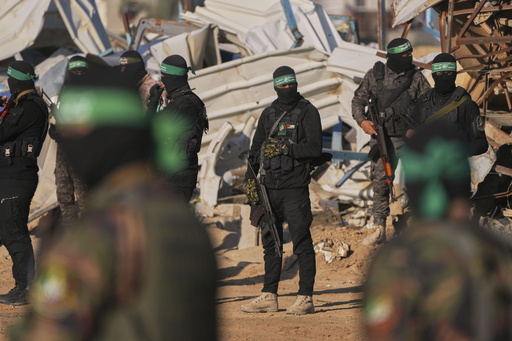JERUSALEM — Hamas has announced the release of three additional Israeli hostages as part of a delicate ceasefire arrangement, indicating progress in the ongoing discussions. This release is slated for Saturday and marks the fifth swap of Israeli captives for Palestinians detained in Israel since the conflict escalated. U.S. and Israeli officials, however, continue to advocate for the relocation of Gaza’s inhabitants in light of the recent war.
The hostages, taken during the assault by Hamas on southern Israel on October 7, 2023, include Eli Sharabi, 52; Ohad Ben Ami, 56; and Or Levy, 34. An unnamed Israeli official corroborated their identities and confirmed their anticipated release. In return, Israel will also release 183 Palestinian prisoners as stipulated in the ceasefire agreement, according to a Gaza-based office connected to Hamas handling prisoners. This initial phase of the agreement spans six weeks and outlines that Hamas will gradually release a total of 33 Israeli hostages in exchange for a larger number of Palestinian detainees.
Sharabi was taken from Kibbutz Beeri, known to be among the hardest hit during the attack, resulting in the tragic loss of his wife, Lianne, and their teenage daughters at the hands of the militants. Ben Ami, who worked as an accountant in the same kibbutz, is also a father of three; his wife was captured but released during a temporary ceasefire in November 2023. Levy, a computer programmer from Rishon Lezion, was taken from a bomb shelter while at the Nova music festival. His wife died during the assault, and their young son is currently being cared for by relatives.
To date, Hamas has released a total of 18 hostages, including five Thai nationals. Last week, Israel reciprocated by freeing 183 Palestinian prisoners in alignment with the ongoing agreement.
Amidst these developments, U.S. President Donald Trump has garnered criticism for his controversial proposal to relocate the entire Palestinian population from Gaza and transform the area into an international tourist destination. He described the plan as a “real estate transaction,” which has drawn significant backlash from Arab nations in the region and the Palestinian populace, who regard enforced displacement as a form of ethnic cleansing. Nevertheless, Trump reiterated on Friday that his proposition was met with a “very well received” response, although it remains unclear how long this resettlement would last. “We don’t want to see everybody move back and then move out in 10 years,” he stated, highlighting concerns about ongoing instability.
Israeli troops have largely pulled out of Gaza, in accordance with the ceasefire, yet they maintain a presence in border regions. The military has warned civilians to steer clear of operational zones where troops are active and has responded with gunfire against those who allegedly violate ceasefire terms.
Negotiations continue regarding the next phase of the agreement, during which Hamas is expected to release a greater number of hostages in exchange for additional Palestinian prisoners and a more durable ceasefire. The Palestinian prisoners’ office has noted that 18 of the prisoners being released on Saturday are serving life sentences, alongside 54 with extended sentences, and 111 who were detained after the outbreak of conflict on October 7.
Among the prisoners scheduled for release is 49-year-old Iyad Abu Shakhdam, who has spent nearly 21 years in jail related to his involvement in violent attacks organized by Hamas that resulted in numerous Israeli fatalities in the early 2000s. He is currently serving 18 life sentences. Another notable name is Jamal al-Tawil, a 61-year-old Hamas politician and former mayor of Al-Bireh in the West Bank, who has faced nearly two decades of intermittent imprisonment. He has been detained without trial since 2021 on charges of orchestrating violent riots.
